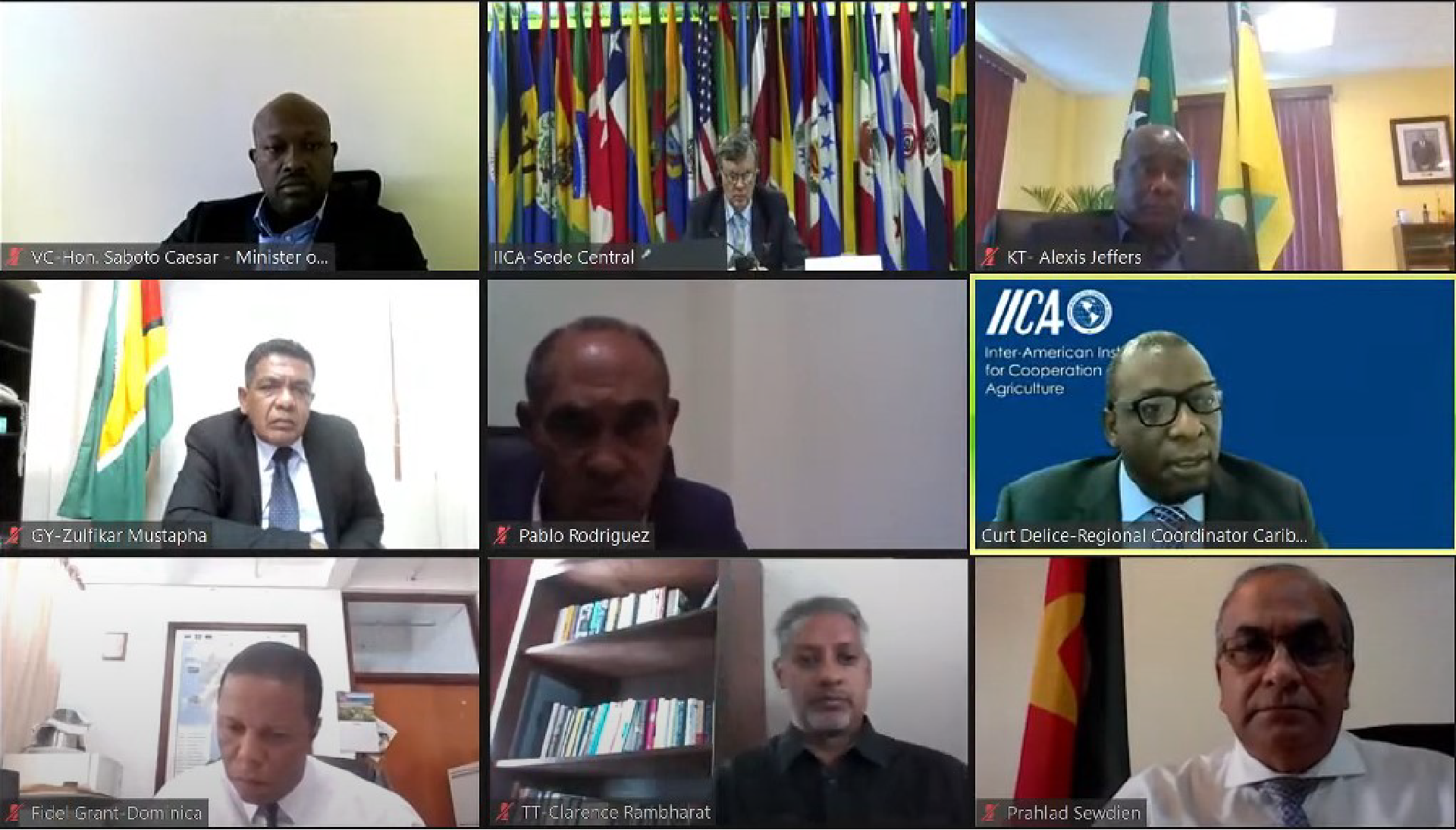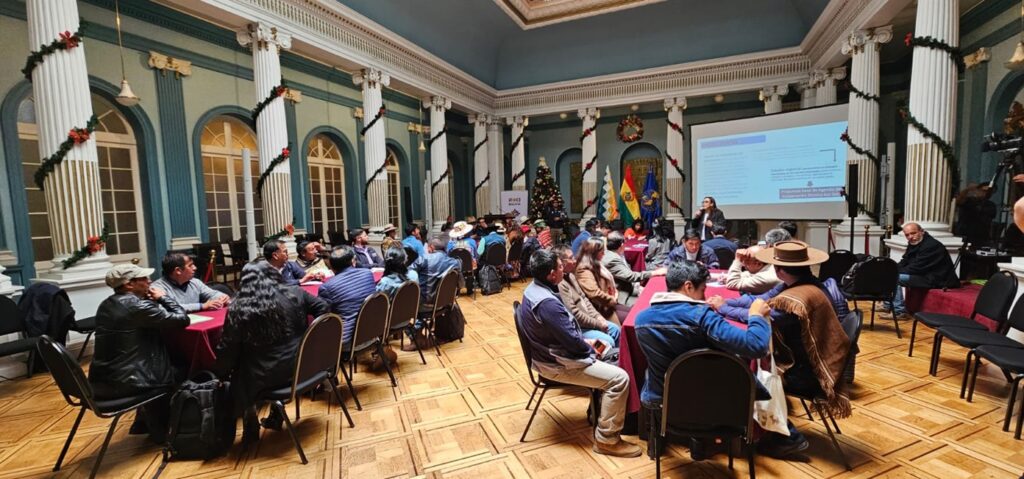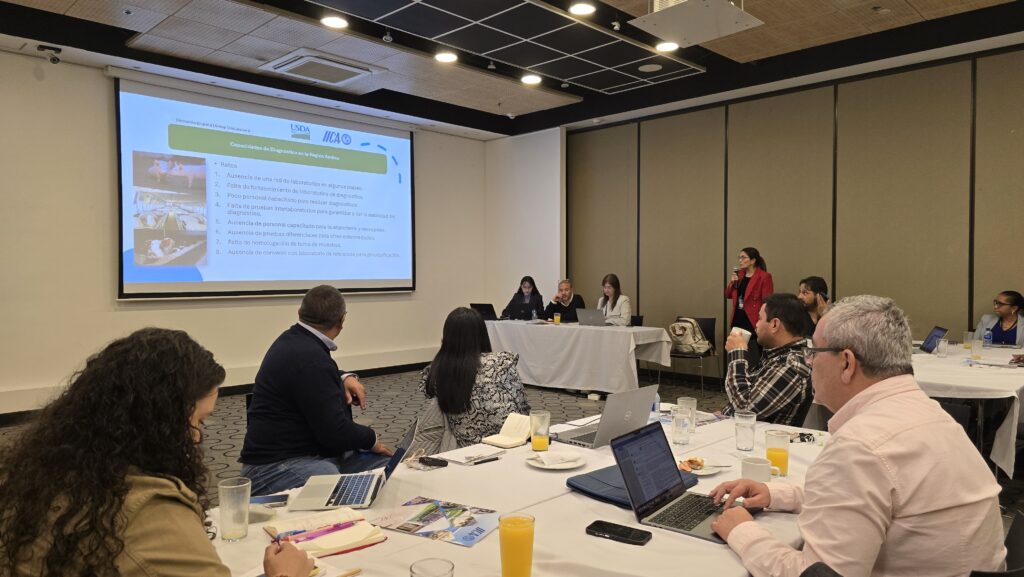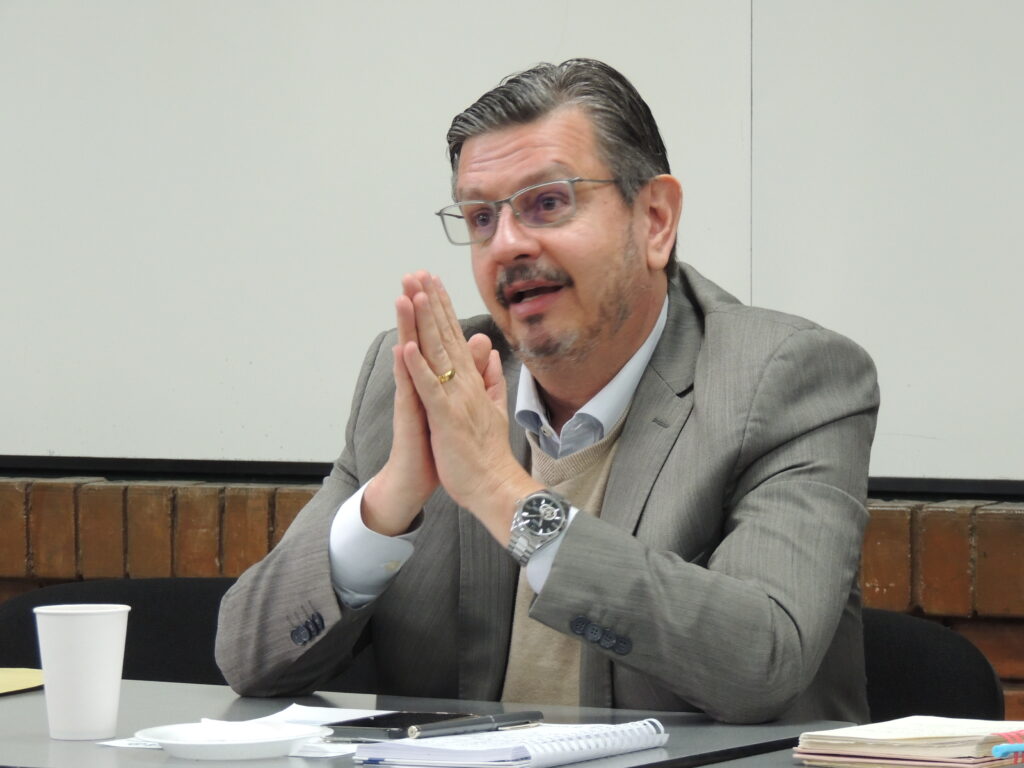Los ministros de Agricultura de los países del Caribe enfatizaron la necesidad de reducir la dependencia de las importaciones de alimentos y digitalizar el campo. Propuestas para incrementar resiliencia ante el cambio climático.

San José, 31 de marzo de 2021 (IICA) – Ministros y Secretarios de Agricultura de 14 países del Caribe expusieron sobre las dramáticas consecuencias de la pandemia de Covid-19 en la región, listaron nuevos desafíos para fortalecer la producción de alimentos y destacaron el apoyo del Instituto Interamericano de Cooperación para la Agricultura (IICA) en el combate a la inseguridad alimentaria y nutricional, tras un 2020 en el que se paralizó el turismo, motor de las economías caribeñas.
Los altos funcionarios se reunieron en forma virtual en el marco del Seminario Regional de Rendición de Cuentas 2020 del IICA, en el que se repasaron las acciones del organismo hemisférico en apoyo del sector productivo del Caribe, se anunciaron nuevas iniciativas y en el que las autoridades agrícolas mantuvieron un diálogo franco sobre las dificultades provocadas por Covid-19, calificando como clave la asistencia técnica recibida.
“En el 2020 el desafío para los sistemas alimentarios fue muy fuerte. Durante este periodo, el IICA nos ha dado apoyo para mejorar la productividad en la agricultura y ampliar la capacidad en la mitigación del cambio climático. Por ejemplo, en nuestro país, nos apoyaron con un proyecto de arroz biofortificado que es de gran importancia para la seguridad alimentaria de Guyana”, ejemplificó Zulfikar Mustapha, Ministro de Agricultura guyanés.
“Es realmente muy emocionante poder tener un ejercicio de rendición de cuentas a este nivel y felicito a (el Director General del IICA) Manuel Otero por su excelente liderazgo durante y antes de la pandemia. Él trabaja diligentemente con su equipo en favor de la agricultura en la región. Estamos experimentando erupciones volcánicas y tendremos una simulación en el sector para prepararnos para enfrentar lo peor, salvar vidas y salvaguardar los bienes de los agricultores. Compartimos la misma visión en dar oportunidades para tener mejores medios de vida en la región. Espero con ansias ver cómo podemos crear más sinergias con la asistencia del IICA entre países”, dijo Saboto Caesar, Ministro de Agricultura de San Vicente y las Granadinas.
“Espero que no tengamos una visión individualista sino que hablemos de las sinergias que nos permiten avanzar como un todo, como región. Las líneas de comunicación deben estar abiertas entre los Estados y el IICA. Las puertas del IICA siempre han estado abiertas para apoyar nuestros esfuerzos regionales”, agregó.
El Director General del IICA expuso los compromisos del organismo hemisférico ante los países caribeños, de modo de seguir apoyando los progresos del sector rural local, entre los que enumeró el mantenimiento de la infraestructura de 14 oficinas, con adecuados recursos humanos y financieros para implementar las estrategias desplegadas en el Caribe, lo que incluye un fondo especial de ayuda a la región.
“Vamos a continuar apoyando propuestas y asegurando financiamiento externo para atender temas agrícolas y de desarrollo rural, actuando como un puente de enlace y facilitación de cooperación horizontal, Sur-Sur y triangular, sacando provecho de las complementariedades entre las diferentes regiones”, indicó Otero, subrayando la relevancia de respaldar la renovación y el posicionamiento de los sectores agrícola y rural en el Caribe post-Covid-19.
En ese sentido, mencionó también la importancia de un respaldo a la región en el marco de la Comunidad del Caribe (CARICOM) a través de un mecanismo de consejería agrícola, sacando provecho de la experiencia del IICA por su actuación como secretaría de foros ministeriales de Centro y Sudamérica, de modo de promover y acompañar la integración regional, además de dar continuidad a programas de cooperación Sur-Sur como Apicaribe, que impulsa el desarrollo apícola.
En el Caribe, el impacto de la pandemia en la economía ha sido tangible. “Hemos visto una reducción en las exportaciones, pérdida de trabajos y el cierre de los hoteles”, sintetizó Fidel Grant, Ministro de Agricultura de Dominica. Los países de la región vieron caer el Producto Interno Bruto (PIB) en hasta un 10% en algunos casos, y la producción agropecuaria es considerada como clave para dar un golpe de timón.
“Nos sentimos optimistas de que esta recuperación prevista sea continua. En Barbados esperamos incrementar nuestra producción para tener productos frescos, porque actualmente dependemos de un 80% de las importaciones para nuestro abastecimiento. Requerimos asistencia del IICA para la innovación, especialmente en el manejo del agua”, expresó Peter Phillips, Representante del Ministro de Agricultura de Barbados, Indar Weir.
“Creamos ferias del agricultor en toda la isla para que las personas pudiesen comprar alimentos. El IICA fue fundamental para ayudarnos a desarrollar los planes de trabajo”, apuntó Elvis Morain, Secretario Permanente del Ministerio de Agricultura de Grenada.
De acuerdo con los ministros, el Covid-19 subrayó desafíos impostergables para el Caribe, como enfrentar los efectos del cambio climático. Aunque las contribuciones de estos países a la generación de gases de efecto invernadero son minúsculas, el impacto de la variabilidad del clima en esta zona es enorme.
“La agricultura en este momento es el único sector en el que podemos tener un buen crecimiento, debe ser nuestro camino futuro para el país y la región. La realidad es que no podíamos depender todo el tiempo de países más grandes para alimentarnos”, dijo Alexis Jeffers, Ministro de Agricultura de San Cristóbal y Nieves.
La agilidad del IICA para trabajar de manera coordinada con los Ministerios encargados de Agricultura en el desarrollo de acciones dirigidas a garantizar la seguridad alimentaria fue resaltada como un elemento clave para que la pandemia no tuviese efectos aún más crueles sobre la región.
Para Joseph Cox, Secretario General Asistente de Comercio e Integración Económica de CARICOM, “el IICA fue rápido para responder a las necesidades de la región y desarrolló una plataforma de comercio electrónico para comunicarnos directa y continuamente entre gobiernos para conocer los niveles de producción”.
La búsqueda de sinergias también fue destacada por Haití. “El deseo de Haití y de los otros países es que haya intercambios aún más intensos. Juntos vamos a atravesar este periodo difícil y a sobrellevar los obstáculos para alcanzar un Caribe más próspero”, manifestó Paul Moise, asesor del Ministro de Agricultura haitiano, Patrix Sévère.
“El IICA nos ha apoyado en nuestro desarrollo agrícola. Nos apoyan en la agenda de género. Tenemos un programa de agricultoras rurales en el que el IICA nos ha brindado asistencia técnica”, manifestó Souraya Niles, representante del Ministro de Santa Lucía, Ezechiel Joseph.
Clarence Rambharat, Ministro de Agricultura de Trinidad y Tobago, aseguró que la crisis por Covid-19 ha encarecido -entre otros rubros- el costo de embarques y transporte de mercancías, pero el país sigue aspirando a fortalecer la agroindustria, con base en la investigación y el comercio.
“En el IICA siempre nos han apoyado en términos de sanidad e inocuidad. Estamos realizando esfuerzos para desarrollar un centro de excelencia en biotecnología que sea referente regional”, afirmó Rambharat.
Tecnología y capacitación: ejes de la recuperación
Una de las estrategias para abordar la crisis se basa en la digitalización de la asistencia agropecuaria. Junto con el IICA y CARICOM se desarrolló una solución tecnológica de bajo costo para que, a través de teléfonos móviles, los productores caribeños puedan acceder a materiales didácticos que les permitan ser más eficientes.
La aplicación AgriExtApp, que se encuentra en fase piloto para Antigua y Barbuda, Bahamas y San Vicente y las Granadinas, fue presentada durante este intercambio ministerial.
Se trata de una app que ofrece contenidos de extensión agrícola para el cultivo de productos como la yuca o el camote (batata), que además de tener un alto valor nutricional podrían significar una excelente alternativa para exportar a otras regiones y para la agregación de valor, con miras a la industria turística.
“Bahamas felicita al IICA por la creación de AgriExtApp y nos honra ser parte del programa piloto”, expresó Delreese Moore Grant, representante del Ministro de Agricultura de este país, Michael Pintard.
Para Gregory Bailey, director de Agricultura del Ministerio de Agricultura de Antigua y Barbuda, “AgriExtApp es una maravilla porque nos permite mejorar la comunicación en una era de distanciamiento social de manera eficiente”.
“Se puede usar la app en momentos de desastres, pues brindará mayor sostenibilidad a nuestra industria agrícola”, expuso Courtney Cole, director técnico del Ministerio de Agricultura de Jamaica, quien también elogió al IICA por su enfoque en la agricultura climáticamente inteligente y el impulso al cultivo de hongos, dirigido a jóvenes y mujeres.
Durante el diálogo se abordó el momento que enfrenta el sector de cara a la Cumbre de Jefes de Estado sobre los Sistemas Alimentarios que organiza la Organización de Naciones Unidas, y que tendrá lugar a finales de septiembre de 2021.
El IICA, representado por su Director General, quien forma parte de la red de Campeones de Cumbres (estructura de apoyo a este encuentro global), impulsa tres consignas para este diálogo: los agricultores primero, la ciencia como base para la discusión de políticas públicas, y la agricultura como parte de las soluciones y no de los problemas.
“No podemos enfrentar nuestros desafíos solos, debemos asociarnos como países del CARICOM. Respaldo la intención del IICA para tener una única posición en la Cumbre y asegurarnos de que no se pierdan nuestros intereses como países en desarrollo ante las naciones más desarrolladas”, dijo Prahlad Sewdien, Ministro de Agricultura de Surinam.
“Hemos declarado al Caribe como nuestra prioridad debido a su vulnerabilidad al cambio climático. Estamos ejecutando cada vez más acciones, siendo coherentes con nuestras estrategias y prioridades para esta región”, finalizó Otero.
Reviva el diálogo ministerial:
https://www.youtube.com/watch?v=03PXvBUNSfQ&ab_channel=IICALearning
AgriExtApp:
Más información:
Gerencia de Comunicación Institucional
comunicacion.institucional@iica.int










